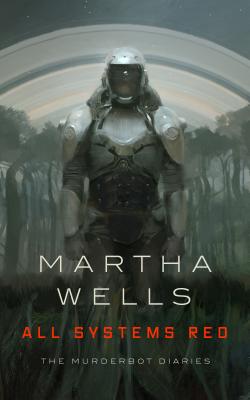I read this a couple weeks ago and could tell you approximately nothing about the plot! I remember having a nice time reading it? It's short, which is to its credit. There is some stuff about untrustworthy corporations, and the main character is a robot whose robot-ness seems to be a metaphor for neurodivergence of some kind? I don't know. It never really came together but also, hey, it was short.
Reviews and Comments
This is where I track and comment on what I'm reading. #nobot
This link opens in a pop-up window
Darius Kazemi reviewed All Systems Red by Martha Wells (Murderbot, #1)
Darius Kazemi commented on Travels in Persia by Sir John Chardin
Free 1695 edition with Funnye Olde Tyme Spellinge: archive.org/details/dli.granth.72113/page/n25/mode/2up
Page that translates many highlights of the book into modern English: depts.washington.edu/silkroad/texts/chardin/chardin.htm
Darius Kazemi reviewed Ninefox Gambit by Yoon Ha Lee (The Machineries of Empire, #1)
A good book in a great series
4 stars
I had no idea what to expect when I went into Ninefox Gambit, and it was extraordinarily confusing for the first... 100 pages or so. The book begins in media res during a big future/magic infantry battle except the magic might be high-level mathematics? In the first 20 pages alone are going to be puzzling your way through deliberately alien concepts like "calendrical rot" and "linearizable force multiplier formations" and "threshold winnowers". These aren't presented a friendly, "here's a new word, we will explain it now, or at least provide some context way." They are presented as things everyone takes for granted, and if you're lucky, in the next 20 or 50 pages you will gather enough contextual knowledge to piece together what they actually mean in the world of the book.
That could all be a really bad thing, but ultimately it ended up being kind of like a …
I had no idea what to expect when I went into Ninefox Gambit, and it was extraordinarily confusing for the first... 100 pages or so. The book begins in media res during a big future/magic infantry battle except the magic might be high-level mathematics? In the first 20 pages alone are going to be puzzling your way through deliberately alien concepts like "calendrical rot" and "linearizable force multiplier formations" and "threshold winnowers". These aren't presented a friendly, "here's a new word, we will explain it now, or at least provide some context way." They are presented as things everyone takes for granted, and if you're lucky, in the next 20 or 50 pages you will gather enough contextual knowledge to piece together what they actually mean in the world of the book.
That could all be a really bad thing, but ultimately it ended up being kind of like a fun puzzle.
Ninefox Gambit (and the following two books in the Machineries of Empire trilogy) ultimately pays off all the weird math/magic stuff. It ends up being an extremely powerful metaphor for the systems that underlay all imperial powers. It's kind of like LeGuin's "The Ones Who Walk Away From Omelas", but writ large as a space opera. I give this book four stars, though I would give the series as a whole five? The series as a whole is greater than the sum of its parts, and I like the first book more in retrospect having read the next two books in the series.
Darius Kazemi reviewed Can't Stop Won't Stop by Jeff Chang
Essential hip hop history
5 stars
This is THE book I recommend to anyone who wants to know about the history of hip hop and particularly its first few decades of existence. Where most histories of hip hop begin with kids in the Bronx in the 1970s, Chang instead begins with the Jamaican sound clashes of the 1950s, drawing a direct line from that culture to New York hip hop via DJ Kool Herc's status as a Jamaican immigrant.
The whole book is rigorous without being academically boring, and it treats the subject with the respect that it deserves. It's full of material from interviews, both pulled from archives as well as ones conducted by Chang himself, but it's not a lazy oral history. Chang does the hard work of providing necessary historical context.
Darius Kazemi reviewed Gideon the Ninth by Tamsyn Muir (The Locked Tomb, #1)
A love-it-or-hate-it proposition
3 stars
Count me as one of the people who really can't stand the author's extremely strong authorial voice. Sometimes it was genuinely funny and I loved it but it was SO omnipresent and overbearing that eventually it felt like I was being told a pretty interesting scifi/fantasy story by someone who desperately needs me to find them hilarious.
I love the world it's set in, I love the whole goth cultists in space thing. I don't like the protagonist and I don't like that most of the characters are emotionally confused teenagers. It feels like I was tricked into reading a mislabeled YA novel. And like, YA is fine, but I like to know what I'm getting into ahead of time?
I think that if your sense of humor aligns with the author you might love this novel! But if you don't, you might hate it.






